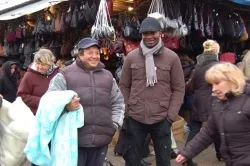It was late 2007. The rumour of the closure of the stadium had turned into real news. It was all over the media.
As those who did not like the increasing black African population in Warsaw celebrated what they believed was going to be the catalyst that was going to force the Africans out of Poland, most of the Africans themselves were faced with an uncertain future. It seemed like a hopeless situation – the stadium was going to be closed.
For most of the Africans who worked at the stadium,the stadium, at the time,seemed like the only place they could earn a living here in Warsaw. For most of them,if the stadium was going to be closed,there was just one option left – leave the country!
It was not just the Africans who were concerned, rather, there was this fear by many Polish people who were in one way or another involved with the Africans. Many Polish girls who were married to African men were worried the most. They feared their men were going to abandon them and travel West.
But many of the racist Polish men who did not like the sight of Africans in Warsaw heaved a huge sigh of relief. They believed there would be a huge exodus of Africans out of Warsaw, out of Poland, and out of sight.
Many of the Africans themselves did not think differently. Many of them started making arrangements to leave. The stage was set for The Great Exodus.
But as the days turned into weeks,and weeks into months,the Africans did not leave. They did not relocate. They did not go West, and the Exodus never happened. The Polish girls never lost their husbands and or boyfriends (most of them, at least).
The stadium, the corona, was eventually closed down and a new place, near Al. Zieleniecka, was provided for the traders. But less than 20% of the Africans moved down to the new place.
The Africans did not leave the country,they did not move down to the new site, so, where are they? Where have they all gone to? Did they vanish?
Although most of the Africans can no longer be seen at the stadium,but they did not vanish. Difficult times had called for drastic measures and the Africans readjusted.
Although the idea of checking out of the country crossed the minds of almost every African that worked at the stadium;although many Africans actually made plans to check out,but when the time came to check out,it became easier said than done. It became very impractical. How do you abandon your wife and or children here in Warsaw and relocate to Germany, Holland or England? What guarantees do you have of getting jobs in those countries? Are you really prepared to start life all over again in those countries?
These were the hard questions that most Africans had to battle with. At the end of the day reality took the place of fantasy and most of the Africans stayed back and looked for jobs in and around Warsaw.
For the first time in Warsaw black people have started working in supermarkets in Warsaw. Many of them have taken up jobs in warehouses and factories in and around Warsaw. The auto assembly plant at FSO has also become a huge employer of many Africans in Warsaw.
Some Africans who did not like the idea of monthly salaries took a different rout. They opened their own shops. Before the stadium was closed, there was no African shop in Warsaw. But now, such shops are springing up in many parts of the city of Warsaw.
Other Africans who had some capital went into the import-export business – exporting Polish products to Africa,as well as importing some African products into Poland.
Although the closure of the stadium caused a lot of distress among most Africans at the beginning, but at the end of the day,it brought out the best in them as well.
Text by: Ify Nwamana, author: Stadium: The Devils' Playground.









